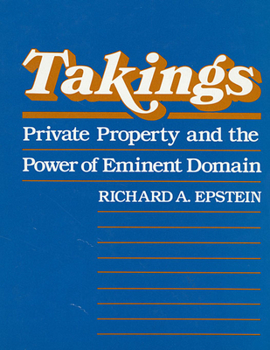Takings: Private Property and the Power of Eminent Domain
Select Format
Select Condition 
Book Overview
If legal scholar Richard Epstein is right, then the New Deal is wrong, if not unconstitutional. Epstein reaches this sweeping conclusion after making a detailed analysis of the eminent domain, or takings, clause of the Constitution, which states that private property shall not be taken for public use without just compensation. In contrast to the other guarantees in the Bill of Rights, the eminent domain clause has been interpreted narrowly. It has been invoked to force the government to compensate a citizen when his land is taken to build a post office, but not when its value is diminished by a comprehensive zoning ordinance. Epstein argues that this narrow interpretation is inconsistent with the language of the takings clause and the political theory that animates it. He develops a coherent normative theory that permits us to distinguish between permissible takings for public use and impermissible ones. He then examines a wide range of government regulations and taxes under a single comprehensive theory. He asks four questions: What constitutes a taking of private property? When is that taking justified without compensation under the police power? When is a taking for public use? And when is a taking compensated, in cash or in kind? Zoning, rent control, progressive and special taxes, workers' compensation, and bankruptcy are only a few of the programs analyzed within this framework. Epstein's theory casts doubt upon the established view today that the redistribution of wealth is a proper function of government. Throughout the book he uses recent developments in law and economics and the theory of collective choice to find in the eminent domain clause a theory of political obligation that he claims is superior to any of its modern rivals.
Format:Paperback
Language:English
ISBN:0674867297
ISBN13:9780674867291
Release Date:January 1985
Publisher:Harvard University Press
Length:376 Pages
Weight:1.23 lbs.
Dimensions:0.9" x 6.1" x 9.3"
Customer Reviews
4 ratings
A must...
Published by Thriftbooks.com User , 15 years ago
Anyone in politics, law, or interested at all in how you are being stripped of your rights - all quite reasonably or not so reasonably need - need to read this book. A very clear insight.
More than it might seem
Published by Thriftbooks.com User , 17 years ago
The author of takings sorts out some vital issues. This book sorts out eminent domain issues, based on a clearly described economic theory of government. Epstein settles the 'Lockean Proviso' issue, and reasons through many other issues. For example, he makes the case for flat taxes over so called progressive taxes. But above all, this book establishes that anything that the government does constitutes a taking of some kind, and takings are only justified in very limited circumstances. Takings is the best reasoned critique of modern transfer states that I have seen. This is one of a few books that has really changed the way I think about political economy. Every Law and Public Policy student should read this book, as should David Souter.
Well-argued
Published by Thriftbooks.com User , 24 years ago
This fine book by Prof. Richard Epstein has probably been more influential than the casual reader may be aware.The heart of Epstein's claim is that _anything_ the government does that imposes any sort of "cost" on anybody amounts to a "taking" for which the Constitution requires just compensation. We all know how this is supposed to work as applied to the usual exercise of eminent domain. But Epstein casts his net wide and argues that the takings clause applies to all sorts of things you never would have thought of -- welfare programs, rent control, jiggery-pokery with the national currency, you name it.The impact of the book is evident mainly through "negative" evidence. For example, some readers may recall that during the Clarence Thomas hearings, somebody asked Thomas if he believed the stuff in this book (as the Congresscritter in question clearly did not). I think Thomas managed to duck the question, but the point was made. And at any rate, it tells you something that somebody found it important to _ask_ the question in the first place.Then, too, my own property-law casebook remarks somewhere near the end that Epstein's views on "takings" have not been found convincing by too many people. Interesting that the book still finds it necessary to mention his work, then.So check it out. Sure, it's radical, and (let's admit it frankly) it's probably not a correct interpretation of the framers' intent. But if you're not a tax-and-spend Congresscritter, maybe you'll find it as pregnant and alluring a suggestion as I do. And it's one of Epstein's best books; I think he wrote it before he had completely converted to utilitarianism. You don't have to agree with it, but you should at least learn why Federalistas are afraid of it.
A classic.
Published by Thriftbooks.com User , 26 years ago
The human right to own and use property is a bedrock of our basic values and freedoms. Epstein's classic book is a seminal (and accessible) analysis of the complex legal and philosophical issues involved. Its original publication in the mid-1980s was also an important political event; it helped trigger the current movement to reinvigerate the right to property, in the Congress and in the Courts. With the Del Monte Dunes case up in the Supreme Court, the argument is getting even hotter. Takings is essential for anyone who wants to understand the issues.James V. DeLong





